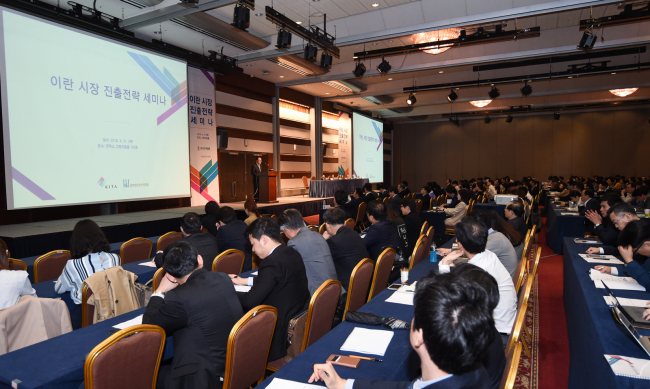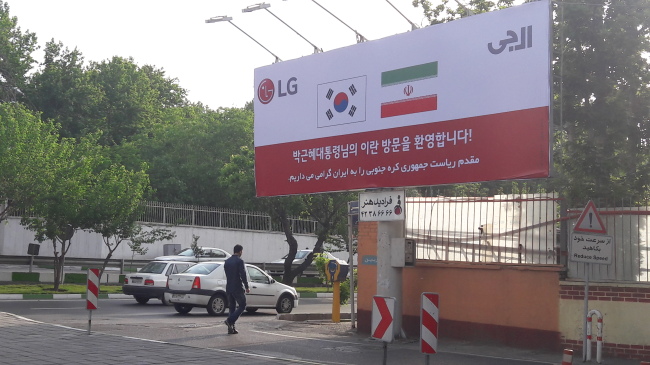President Park Geun-hye’s historic visit to Iran is expected to significantly improve the diplomatic, economic and cultural relations between the two countries, according to Cheong Wa Dae.
The four-day trip from Sunday to Wednesday is part of the South Korean government’s endeavor to seize business opportunities in the Iranian market, following the lifting of international sanctions earlier this year.
“Iran was once a place where our workers sweated under scorching heat to build the economic foundation of our nation, but (such ties) have been challenged due to international sanctions,” the president said last Thursday at a regular Cabinet meeting.
The four-day trip from Sunday to Wednesday is part of the South Korean government’s endeavor to seize business opportunities in the Iranian market, following the lifting of international sanctions earlier this year.
“Iran was once a place where our workers sweated under scorching heat to build the economic foundation of our nation, but (such ties) have been challenged due to international sanctions,” the president said last Thursday at a regular Cabinet meeting.

“The government should exert its efforts to normalize bilateral trade and to cooperate with the private sector in helping companies participate in the construction of railroads, harbors, power plants and oil refineries in Iran.”
Since the United Nations certified Iran’s commitment to curbing nuclear activities and lifted comprehensive sanctions in January, Iran has aggressively propelled a number of infrastructure development projects, seeking to rebuild its economy after years of isolation.
With the world’s largest reserve of natural gas and the fourth-largest reserve of crude oil, the long-neglected Persian state is largely recognized as one of the few remaining blue ocean markets.
Adding to the country’s attraction is its vast land area of 1.6 million kilometers square, which is the second-largest in the Middle East and the 18th largest in the world, as well as its geographic merit, bridging the Middle East and Eastern Europe.
Also, its population of some 80 million inhabitants guarantees it as one of the largest markets in the underdeveloped part of the world.
President Park is scheduled to meet with Iranian counterpart Hassan Rouhani on Monday, marking the first summit between the two countries since they first established diplomatic channels back in 1962.
Since the United Nations certified Iran’s commitment to curbing nuclear activities and lifted comprehensive sanctions in January, Iran has aggressively propelled a number of infrastructure development projects, seeking to rebuild its economy after years of isolation.
With the world’s largest reserve of natural gas and the fourth-largest reserve of crude oil, the long-neglected Persian state is largely recognized as one of the few remaining blue ocean markets.
Adding to the country’s attraction is its vast land area of 1.6 million kilometers square, which is the second-largest in the Middle East and the 18th largest in the world, as well as its geographic merit, bridging the Middle East and Eastern Europe.
Also, its population of some 80 million inhabitants guarantees it as one of the largest markets in the underdeveloped part of the world.
President Park is scheduled to meet with Iranian counterpart Hassan Rouhani on Monday, marking the first summit between the two countries since they first established diplomatic channels back in 1962.

“The state visit will serve as an occasion to elevate the stalled bilateral ties to a new level,” Kim Kyou-hyun, senior presidential secretary for foreign affairs, told reporters last week.
“President Park has already visited four (among the six) member states of the Gulf Cooperation Council, so her visit to Iran will expand her diplomatic orbit beyond the Arab world into the Persian zone as well.”
The presidential office is also pushing for Park’s meeting with Iran’s supreme religious leader Ayatllah Ali Khamenei, following the summit.
Displaying Seoul’s keen interest in Iran, a largest-ever business delegation is set to accompany the president to explore new overseas revenues. The 236 companies range from top conglomerates such as Samsung Electronics and Hyundai Motor to small and medium-sized enterprises.
“We hope to pull up the Korea-Iran trade volume from the current $6.1 billion back to the pre-sanction level of $17.4 billion and more,” said An Chong-bum, senior presidential secretary for economic affairs.
“This time, we could also diversify the fields of cooperation to medical, information technology and culture, stepping beyond the conventional construction-focused manufacturing sectors.”
Foreign Minister Yun Byung-se, too, encouraged the hopeful expectations by alluding to a high yield deal.
“There is a possibility that (South Korean firms) will win an order worth $10 billion or more during the presidential visit,” the minister told reporters early last week.
“(Iran) appreciates the fact that many Korean companies chose to stay in Iran during the western world’s sanction period and we expect such positive sentiment to take shape in the form of economic cooperation.”
In a move to enhance such bilateral exchanges, the Foreign Ministry signed an agreement with the Iranian traffic and policy agency earlier this week to allow their citizens to drive in both countries with a license obtained in either country.
While Seoul remained upbeat over its anticipated partnership with Iran, some warned of the challenges, one of which is fierce competition with other aspiring investor countries.
In January, Chinese President Xi Jinping headed to Iran, marking the first state visit there following the lifting of sanctions.
Also, the Korea Customs Service data showed that the nation’s exports to Iran in the first quarter of the year stood at $660 million, down 44.7 percent on-year.
By Bae Hyun-jung (tellme@heraldcorp.com)
“President Park has already visited four (among the six) member states of the Gulf Cooperation Council, so her visit to Iran will expand her diplomatic orbit beyond the Arab world into the Persian zone as well.”
The presidential office is also pushing for Park’s meeting with Iran’s supreme religious leader Ayatllah Ali Khamenei, following the summit.
Displaying Seoul’s keen interest in Iran, a largest-ever business delegation is set to accompany the president to explore new overseas revenues. The 236 companies range from top conglomerates such as Samsung Electronics and Hyundai Motor to small and medium-sized enterprises.
“We hope to pull up the Korea-Iran trade volume from the current $6.1 billion back to the pre-sanction level of $17.4 billion and more,” said An Chong-bum, senior presidential secretary for economic affairs.
“This time, we could also diversify the fields of cooperation to medical, information technology and culture, stepping beyond the conventional construction-focused manufacturing sectors.”
Foreign Minister Yun Byung-se, too, encouraged the hopeful expectations by alluding to a high yield deal.
“There is a possibility that (South Korean firms) will win an order worth $10 billion or more during the presidential visit,” the minister told reporters early last week.
“(Iran) appreciates the fact that many Korean companies chose to stay in Iran during the western world’s sanction period and we expect such positive sentiment to take shape in the form of economic cooperation.”
In a move to enhance such bilateral exchanges, the Foreign Ministry signed an agreement with the Iranian traffic and policy agency earlier this week to allow their citizens to drive in both countries with a license obtained in either country.
While Seoul remained upbeat over its anticipated partnership with Iran, some warned of the challenges, one of which is fierce competition with other aspiring investor countries.
In January, Chinese President Xi Jinping headed to Iran, marking the first state visit there following the lifting of sanctions.
Also, the Korea Customs Service data showed that the nation’s exports to Iran in the first quarter of the year stood at $660 million, down 44.7 percent on-year.
By Bae Hyun-jung (tellme@heraldcorp.com)
-
Articles by Korea Herald




![[Herald Interview] 'Amid aging population, Korea to invite more young professionals from overseas'](http://res.heraldm.com/phpwas/restmb_idxmake.php?idx=644&simg=/content/image/2024/04/24/20240424050844_0.jpg&u=20240424200058)












![[KH Explains] Korean shipbuilding stocks rally: Real growth or bubble?](http://res.heraldm.com/phpwas/restmb_idxmake.php?idx=652&simg=/content/image/2024/04/25/20240425050656_0.jpg&u=)

